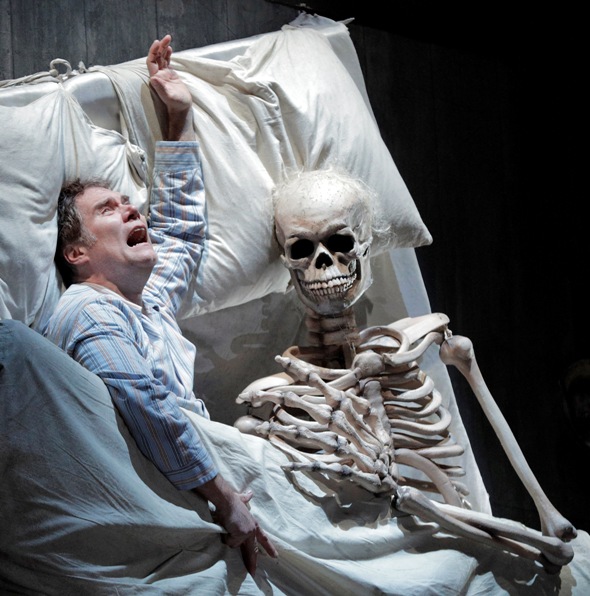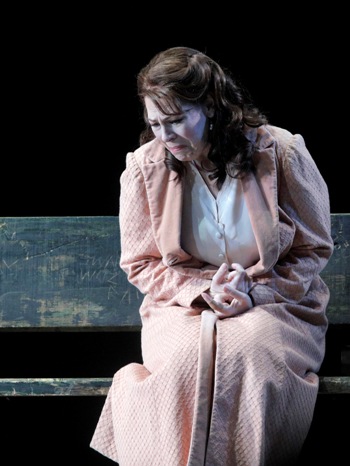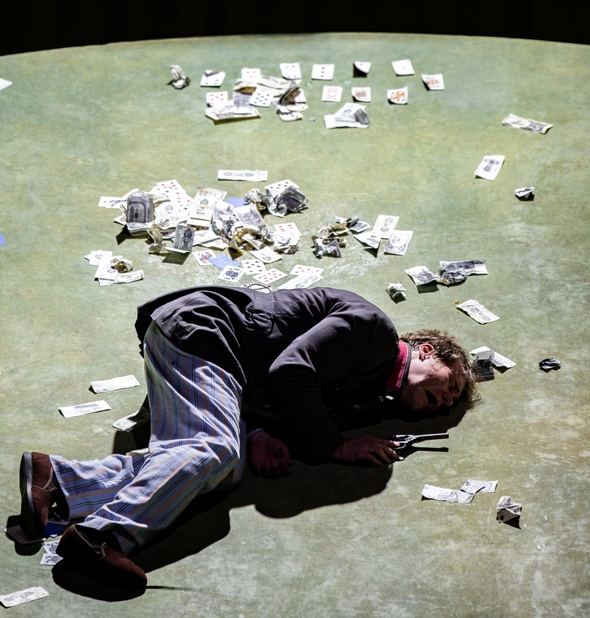‘Queen of Spades’ at Lyric Opera of Chicago: Tchaikovsky’s grand drama draws dicey hand
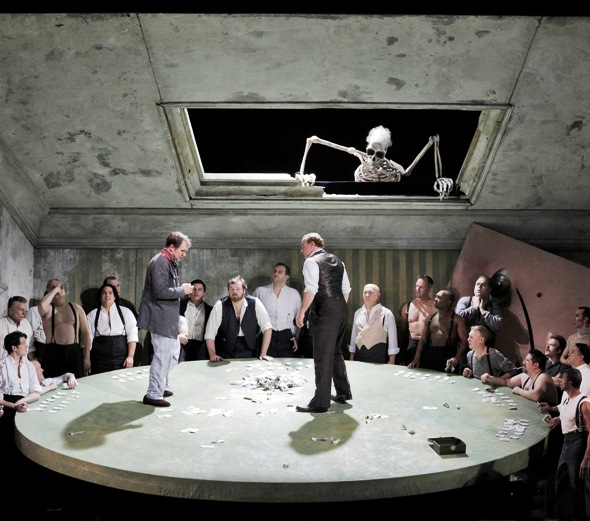
Gherman (Brandon Jovanovich, left) is convinced he knows the three-card secret to a winning hand in Tchaikovsky’s “The Queen of Spades.” (Photos by Cory Weaver, Lyric Opera of Chicago)
Review: “The Queen of Spades,” by Pyotr and Modest Tchaikovsky, at Lyric Opera of Chicago through March 1. ★★★
By Nancy Malitz
“The Queen of Spades” (or as the Russians say, “Pikovaya dama”) is without question a great opera, among Tchaikovsky’s best works of any kind, with enthralling tragedy and voluptuous, soaring music. He wrote it in a hot streak of creativity that also produced his ballet “Sleeping Beauty” and his wrenchingly personal and passionate last symphony, the “Pathetique.” He even wrote that he considered “The Queen of Spades” to be the culmination of his life’s work.
Yet I found myself frustrated when I saw it at Lyric Opera of Chicago, gloriously conducted though it was by music director Andrew Davis, and sung brilliantly by tenor Brandon Jovanovich as an obsessive gambler in a tailspin, soprano Sondra Radvanovsky as the blossoming granddaughter of nobility who falls for him, and a supporting cast of top-notch singing actors. Really, for the casting of it, “The Queen of Spades” counts among the very best operas Lyric has recently given. Tchaikovsky’s late-romantic music was in sharp focus and voluptuous flower.
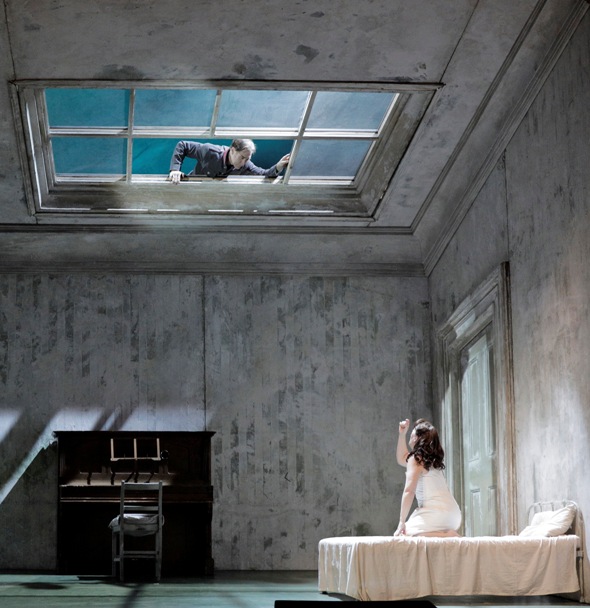
Gherman plunges into Lisa’s room in his fevered excitement to win the girl and her grandmother’s gambling secret. Richard Jones’ staging updates the action to Russia’s post-imperial 1930s.
The British director Richard Jones, born in 1953, is one of the best in his generation of theater and opera directors who shook up the tradition-bound world of Theater with a capital T. That wave wrenched Boomer relevance and sexual revolution naughtiness from opera warhorses, and it excited a new era of theater artists to think about opera’s possibilities in the process.
But this willfully shocking “Queen of Spades,” from 2000 and revived here by Benjamin Davis, remains mostly confusing. For an opera like Puccini’s “La bohème,” which is after all an American cultural meme – with Jonathan Larson’s Broadway show “Rent,” the Cher-driven movie “Moonstruck” – a revisionist take could well be understood as a riff on something familiar. It might be to viewers’ high delight, or to their high dudgeon, but at least there would be a broadly shared point of reference and some potential beguilement in the argument.
“The Queen of Spades” is relatively unfamiliar in Chicago, and unlikely to return any time soon. It is a suspenseful treasure as Tchaikovsky composed it (to a libretto by his brother Modest). The hallucinating and suicidal soldier Gherman is a gambler in almost supernatural free fall as his catastrophe progresses.
Thus one can only wonder what dismay the powerful tenor Jovanovich, as Gherman, must have felt when laughs rippled through the audience in the opera’s most Hitchcockian scene. It’s supposed to be a shattering moment, when Gherman sees the ghost of the very old Countess – whom he had recently scared literally to death in his attempt to pry out her “three cards” secret to winning at the gambling tables. In Jones’ production, the visitor is not a 90-year-old wraith, but rather a super-large skeleton that climbs into bed with Gherman. Whether gigglers realized it was supposed to be the dead Countess is anybody’s guess.
The story of the Tchaikovsky brothers’ opera, altered with generously theatrical flair from leaner Pushkin, takes place in 18th-century imperial St. Petersburg (Mozart’s time). Army officer Gherman falls hopelessly in love from afar with Lisa, the Countess’ granddaughter, yet she is considerably above his rank. Gherman accidentally overhears his fellow soldiers talk about the Countess’ legendary “three-card” gambling trick and becomes obsessed with obtaining the secret to improve his fortunes and win the girl.
Tchaikovsky adds a masked ball attended by Catherine the Great, provides a graceful musical tableau for Lisa and her noble girlfriends, and gives the aged Countess an extraordinary reverie that must have been the delightful inspiration for Stephen Sondheim’s droll “Liaisons” in his musical “A Little Night Music.” And it is with heightened music that Tchaikovsky exploits the doomed lovers’ deaths. But it is precisely such romantic elaborations that the Jones production downplays in favor of Pushkin’s astringent rigor, and perhaps Jones’ own preference for brass, buttocks and bite. Jones’ startling approach discourages connecting with these characters as anything but symbols.
In fact, Jones out-Pushkins Pushkin when it comes to darkness and cynicism. This production is framed in the 1930s, with sets and costumes of John Macfarlane as forlorn relics of the defunct Russian Empire. Lisa’s rooms are very Grey Gardens, claustrophobic and shabby; the young women are unattractively presented in shapeless slips. And both Gherman and Lisa are given body language that identifies them as utterly awkward losers. Their dysfunctional love scene is severely bleak comedy that apparently gets the job done in the homeliest and most awkward of encounters.
The universal nature of love’s first passion thus cobbled, and Tchaikovsky’s glorious music notwithstanding, Jones adds a demonic layer to Gherman’s gambling obsession: In this production, one of Gherman’s superior officers, Count Tomsky (bass-baritone Samuel Youn) is a Mephistophelian manipulator dressed as a leather biker dude (cue “Faust”). The question arises whether the story, in Jones’ view, revolves around Gherman’s personal crisis and Lisa’s tragedy at all, or whether they’re seen as mere puppets in Tomsky’s scheme. (There are also real puppets in this show – a charming pantomime that indeed worked as a presaging tell.)
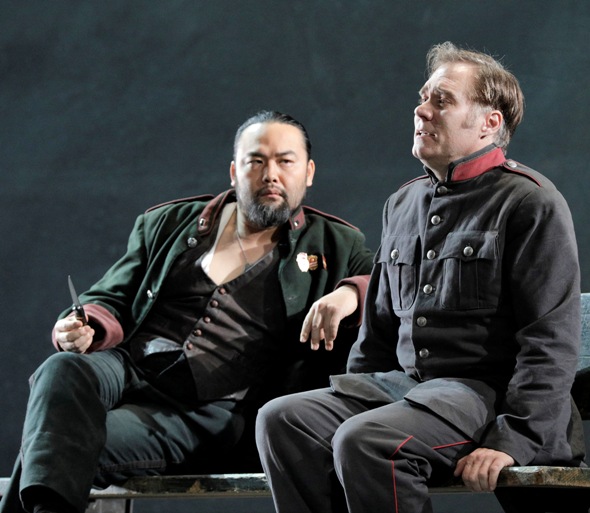
Count Tomsky (bass-baritone Samuel Youn, left) is a Mephistophelian manipulator dressed as a leather biker dude. Gherman (Javonovich) is easily influenced.
Although Jones’ production deflects from the essential humanity of desperate Gherman and the smitten girl who enables him, Tchaikovsky’s music for them is highly sympathetic. The suitor is a tormented man whose obsession causes stupendous collateral damage, especially to the innocent young Lisa whose passion he arouses. Something like it happened to Tchaikovsky, whose attempt to turn a friendship into marriage in denial of his homosexuality resulted in miserable, humiliating deceit. His music makes you feel love’s blind danger, the nightmare of misalignment.
Tchaikovsky’s opera premiered in 1890 as a credible and deeply touching embrace of Gherman and Lisa in their passion and turmoil. The opera soon conquered the world’s musical capitals: Rachmaninoff conducted it in Moscow, Mahler in Vienna and at the Metropolitan Opera in New York. To look at a production closer to the message and setting of Tchaikovsky’s original, you can go here. .
Davis led the Lyric Opera Orchestra in a sumptuous and alluring performance that was dramatically plausible even its most intense, bizarre, and expressionistic moments. And the news is all good regarding the singers, who reflected the full range of the Tchaikovsky brothers’ high drama and heartbreak.
For Sondra Radvanovsky, who has aced opera’s Italian bel canto dramas and moved smoothly into Verdi and Puccini, Lisa was an impressive role debut, well-suited to her increasingly robust and flexible voice. “Why these tears?” (Otkuda eti slyozï), her arioso bewailing her inexplicable attraction to the stranger Gherman, instead of the prince to whom she’s betrothed, soared with bewilderment and anxiety. And Jovanovich’s winning-at-cards aria, sung at the giddy height of his soon-to-end winner’s streak, was the quintessential example of why this American tenor is in such high demand internationally.
(At Lyric alone this season, Jovanovich will take on the heroic tenor role of Siegmund, and also the great god Wotan’s sidekick Froh, in the forthcoming Ring Cycle, after having brought us thoughtless Pinkerton, breaker of Cio-Cio San’s heart, in “Madama Butterfly.” This Gherman is a new role for him.)
Youn, as Count Tomsky, went all-in for Tomsky’s bad guy puppet-master persona, reflecting an ability to inject malevolent color and nasty nuance at will. His grotesque gambling house showstopper was the equivalent of Mephistofele’s “Song of the Gold Calf” (Le veau d’or) in Gounod’s“Faust,” and he sang it well.
Baritone Lucas Meachem, who last starred at Lyric as the insidious Don Giovanni, offered here a love song of supreme nobility as the dignified Prince Yeletsky, who is genuinely in love with the distracted Lisa in Tchaikovsky’s version of the tale. Too bad Meachem was continually upstaged during his gorgeous aria, as twitchy Gherman distracted Lisa utterly with his stalking. Still, Meacham sang superbly.
And for sheer richness in the mezzo-soprano realm, Elizabeth DeShong’s Pauline, who sings a touchingly intimate ballad among Lisa’s friends, and Jane Henschel’s Countess in her dotage, who reminisces about how she once enchanted all of royal Paris, were wholly mesmerizing in their moments.
Related Link:
- Performance location, dates and times: Details at TheatreInChicago.com

